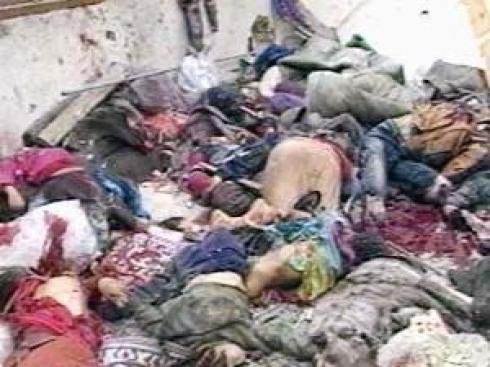rom6553612 hours ago
Friday, September 20, 2019
Wars make sense to some - but they shouldn't to most
rom6553612 hours ago
Wednesday, September 18, 2019
Killing civilians in cages is an old Israeli hobby, it seems - Massacre at Sabra and Shatila Refugee camps in Lebanon
Extract:
...
source:
https://www.aljazeera.com/indepth/opinion/remembering-sabra-shatila-massacre-35-years-170916101333726.html
Extract from:
...
Israeli troops surrounded the camps to prevent the refugees from leaving and allowed entry of the Phalange, a known enemy of the Palestinians. The Israelis fired flares throughout the night to light up the killing field - thus allowing the militiamen to see their way through the narrow alleys of the camps. The massacre went on for two days. As the bloodbath concluded, Israel supplied the bulldozers to dig mass graves. In 1983, Israel's investigative Kahan Commission found that Ariel Sharon, the Israeli Defense Minister, bore "personal responsibility" for the slaughter.
The massacre at Sabra and Shatila was a direct consequence of Israel's violation of the American-brokered ceasefire and the impunity bestowed on Israel by the US and the international community.
https://www.aljazeera.com/indepth/opinion/remembering-sabra-shatila-massacre-35-years-170916101333726.html
Extract from:
The direct perpetrators of the killings were the "Young Men", a gang recruited by Elie Hobeika, the Lebanese Forces intelligence chief and liaison officer with Mossad, from men who had been expelled from the Lebanese Forces for insubordination or criminal activities.
[10] The killings are widely believed to have taken place under Hobeika's direct orders. Hobeika's family and fiancée had been murdered by Palestinian militiamen, and their Lebanese allies, at the Damour massacre of 1976,[11][12] itself a response to the 1976 Karantina massacre of Palestinians and Lebanese Muslims at the hands of Christian militants. Hobeika later became a long-serving Member of the Parliament of Lebanon and served in several ministerial roles.[13]
Other Phalangist commanders involved were Joseph Edde from the South, Dib Anasta, head of the Phalangist Military Police, Michael Zouein and Maroun Mischalani from East Beirut. In all 300-400 militiamen were involved, including some from Sa'ad Haddad's South Lebanon Army.[14]
In 1983, a commission chaired by Seán MacBride, the assistant to UN secretary general and president of United Nations General Assembly at the time, concluded that Israel, as the camp's occupying power, bore responsibility for the violence.[15] The commission also concluded that the massacre was a form of genocide.[16]
In 1983, the Israeli Kahan Commission, appointed to investigate the incident, found that Israeli military personnel, aware that a massacre was in progress, had failed to take serious steps to stop it. The commission deemed Israel indirectly responsible, and Ariel Sharon, then Defense Minister, bore personal responsibility "for ignoring the danger of bloodshed and revenge", forcing him to resign.[17]
Thursday, September 5, 2019
Subscribe to:
Posts (Atom)










